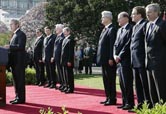On March 29, President Bush welcomed seven countries into the North Atlantic Treaty Organization (NATO). This expansion is the largest in NATO’s history, bringing the number of member countries up to 26.
Bulgaria, Estonia, Latvia, Lithuania, Romania, Slovkia, and Slovenia have been working since 1999 to reform their countries as directed by the Membership Action Plan designated by NATO. In 2002, they received invitations to join NATO, according to 4NI, an online newspaper.
Junior Bobby Iordanov, from Bulgaria, said, “[Joining NATO] is a good thing, part of the process toward greater integration.”
The seven new NATO members are all the more welcome in the alliance because of their pasts.
Each of the countries was once a satellite of the communist Soviet Union, and their adoption into NATO is an enormous step toward a continent-wide alliance.
NATO’s usefulness has been in question since the fall of the Soviet Union but seems to have taken a new direction. On March 29, President Bush recalled NATO’s role not only in the fall of the Berlin Wall but also in Bosnia and Kosovo, according to online magazine, Insight on the News.
“In joining NATO, we’re also joining the fight against terrorism,” said Iordanov.
The anti-terrorism fight may also have been adopted by longtime NATO enemy Russia. Russian President Vladimir Putin began talks with NATO officials regarding an unprecedented move. Russia and NATO members are working on a deal to strengthen their defensive forces by mutually deploying combat units on each others’ territories.
The reason for this deal seems to be the joint Russia/NATO fight against terrorism. In 2001, Russia allowed NATO forces to use its air and railways and backed the military operation in Afghanistan in the U.S.-led anti-terrorism campaign.
“Russia assists NATO countries in their peacekeeping operations in Afghanistan, the success of which contributes to Russia as well,” said Russian foreign military spokesman Alexander Yakovenk, according to the PakTribune.
Russian Defense Minister Sergei Ivanov arrived in the U.S. on April 5 for a conference to discuss the possibilities of Russia and NATO working together against terrorism.
However, Moscow officials accuse NATO of only adopting the nations of Estonia, Lithuania, and Latvia to encircle Russia. The three countries have had troubled relationships with Russia in the past, according to Wired News.
According to the Embassy of the United States website, Secretary of State Colin Powell responded to those worries on April 2 after an alliance meeting in Brussels.
“You’re not our enemies anymore,” said Powell. “We’re going to adjust to the new threats that are out there.

